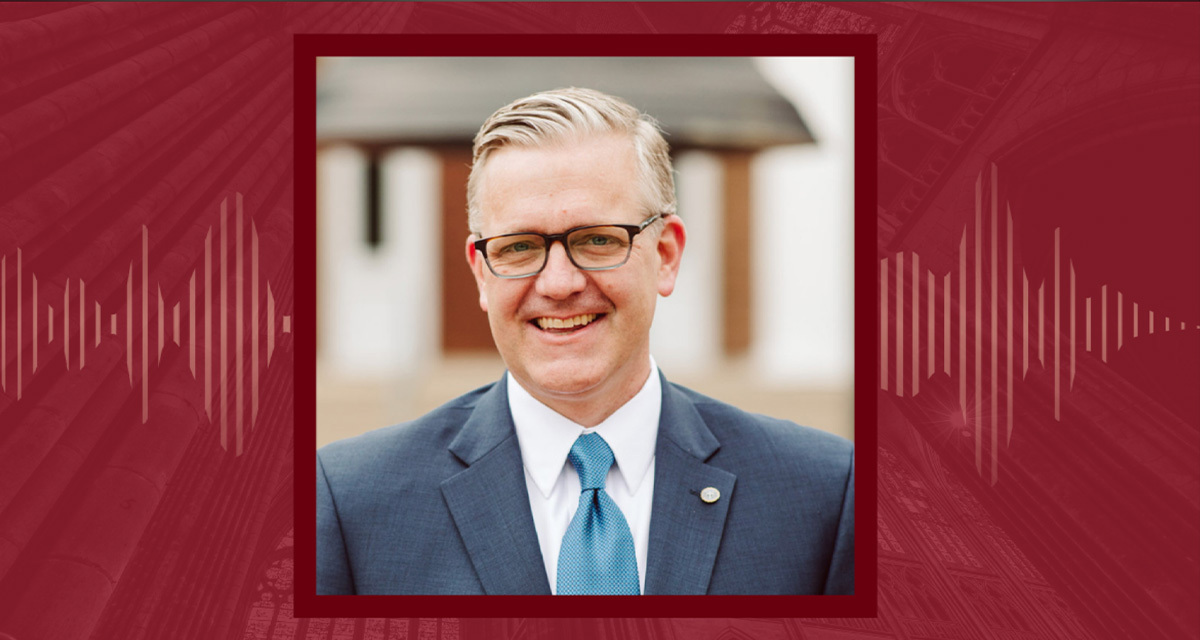Highlights from President Mike Hammond’s Saturdays at Seven Podcast Appearance
Across the country morale at institutions of higher education has reached a record low. CUPA-HR reported in 2023 that the 2022–2023 academic year was the highest on record for employee turnover since their tracking began in 2017. With many leaving the field, is it too late for higher education to resolve such an issue? And if it is not too late, how can this trend be reversed?
On Saturday, April 6, Gordon College President Michael Hammond was a guest on the Christian Scholar’s Review podcast Saturdays at Seven, a conversation series with thought leaders about the relationship between academic vocation and faith. In the episode Hammond and Todd Ream, publisher for Christian Scholar’s Review and the host of Saturdays at Seven, discussed morale in higher education and how Gordon has sought to combat this trend through embodying its mission and creating space for innovation.
Improving Morale with Mission and Innovation
For Hammond, key factors to building good morale include mission and belonging. No workplace is perfect, but if people are working toward a purpose they truly believe in and are surrounded by people who support and include them, employees are more motivated to push through the challenges.
This is why Gordon has reexamined and returned to its core mission: serving the church through the Great Commission by professionally preparing students to thrive in a broken world. “If you line up missionally with the place where you’re serving—or even if you serve at a place where you have freedom to pursue a research agenda or a publication agenda that’s really true to your heart and your calling—there’s nothing more rewarding than that,” Hammond says.
Additionally, if employees don’t feel like they’re being listened to or are a part of their community, eventually they will leave. “So you start to cultivate relationships built on trust, and then you empower people, either through resources or permission or creating an atmosphere of innovation,” Hammond says. “You empower people to dream a little bit and to take a risk and give them the opportunity to fail without being punished. You provide accountable relationships, but not punitive relationships around that accountability.”
There will always be challenges to belonging and inclusion, so creating spaces for this kind of dialogue to happen is essential. But so is following through with action to realize people’s hopes and ideas. Creating committees or task forces with no fruit only frustrates people.
“We’ve tried to cultivate a spirit of innovation. I’ve encouraged the faculty to lead that. And you can see some of the ways we’ve changed the way we tell our story on campus. We’ve created some new initiatives and academics that really put the faculty at the center of what innovation should look like.”
Mike Hammond
Bringing Hope Through Higher Education
Christian higher education institutions like Gordon have an even greater calling and opportunity to be leaders in the ministry of higher education, especially in New England. Given the current religious, political and other divisions in our region and nationwide, religious universities can show how to build bridges and dialogue amidst disagreement.
Gordon has a history of leading the way with these conversations, off campus and throughout New England. Presently, Gordon’s faculty take this vocation seriously and have good collaborations with scholars in the region, engaging with outside experts who come to Gordon’s campus and providing opportunities for students off-campus, through events like guest lectures and Center for Faith and Inquiry events.
“Our students have also responded,” Hammond says. “Our students lead in ways that I’m really impressed by with their programming that they do on challenging issues, issues of race, issues of global challenges. And they’ve done a good job of leading some of that dialogue alongside our faculty.”
Moving the Mission Forward
Gordon has an enormous opportunity to grow in its morale, mission and impact, especially amidst the spiritual backdrop of New England. Hammond is hopeful not only for the future of Gordon but for Christian higher education, especially if institutions can boost the morale within their own walls. Then that love and vision will spill over onto their surrounding communities, slowly changing not only higher education, but also society for the better.
In a spiritual sense Hammond says Gordon seeks to reverse the spiritual drain in New England. “Gordon recruits students from all over the country, all over the world, and they end up loving New England, and they stay here and fill the churches in New England, get involved in ministry and do outreach in the community. And we love that that’s part of our mission.”
You can watch the interview online or listen to the entire podcast on Spotify.
 The Bell
The Bell